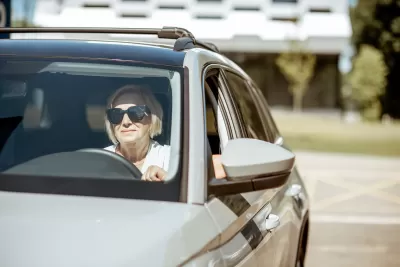Limited transit options and a lack of walkability mean more older Americans will continue to drive their cars as they age.

A survey conducted by the AARP reveals that many older Americans don’t believe they’ll ever have to stop driving, according to an article by Lloyd Alter.
The survey finds that adults 50-plus expect to make changes as they age, including bathroom changes and even anticipate the need for ramps and chair lifts. But there is no mention anywhere of the most significant and dramatic change in people’s lives as they age: the ability to drive.
Studies have found that older drivers can expect roughly seven to 11 years of life after driving becomes difficult or impossible. “That might mean 11 years of failing health in a single-family house in the suburbs, without a car, without family nearby, and without being in a walkable neighborhood.” And a 2020 study found a preference for personal vehicles even when public transit is available. “As a result, driving is synonymous with personal transportation mobility, and driving cessation is associated with loss of independence combined with becoming a burden to family and friends,” that study noted.
The AARP survey includes recommendations for how communities can better accommodate older residents and provide alternatives to driving. For Alter, “We need accessible housing, and walkable communities with good sidewalks, corner stores, medical facilities and coffee shops within a reasonable distance. We need good safe accessible transit for when we have to go further. We all must prepare for a non-driving future.”
FULL STORY: Survey: Boomers Don’t Accept That They Won’t Be Able To Drive Forever

Maui's Vacation Rental Debate Turns Ugly
Verbal attacks, misinformation campaigns and fistfights plague a high-stakes debate to convert thousands of vacation rentals into long-term housing.

Planetizen Federal Action Tracker
A weekly monitor of how Trump’s orders and actions are impacting planners and planning in America.

In Urban Planning, AI Prompting Could be the New Design Thinking
Creativity has long been key to great urban design. What if we see AI as our new creative partner?

King County Supportive Housing Program Offers Hope for Unhoused Residents
The county is taking a ‘Housing First’ approach that prioritizes getting people into housing, then offering wraparound supportive services.

Researchers Use AI to Get Clearer Picture of US Housing
Analysts are using artificial intelligence to supercharge their research by allowing them to comb through data faster. Though these AI tools can be error prone, they save time and housing researchers are optimistic about the future.

Making Shared Micromobility More Inclusive
Cities and shared mobility system operators can do more to include people with disabilities in planning and operations, per a new report.
Urban Design for Planners 1: Software Tools
This six-course series explores essential urban design concepts using open source software and equips planners with the tools they need to participate fully in the urban design process.
Planning for Universal Design
Learn the tools for implementing Universal Design in planning regulations.
planning NEXT
Appalachian Highlands Housing Partners
Mpact (founded as Rail~Volution)
City of Camden Redevelopment Agency
City of Astoria
City of Portland
City of Laramie





























